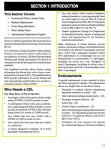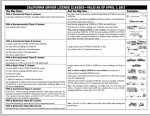Rustystud, you present a good rebuttal and I would say that my interpretation is not law and I would refer to a lawyer who specializes in vehicle code over myself before taking that leap of faith.
I agree with you that some States are not as clear or enforcing of the laws/vehicle codes when it comes to Military Vehicles, I would have to guess simply because they are in the extreme minority of drivers and spend the least amount of time occupying the roads, but that is just my guess, with nothing to back it up.
I'm not sure what your State of Washington defines tractor and Farm tractor or if they are one in the same.
I would take your example of a tractor as a farm vehicle for how California defines it. A "Farm" tractor, as per California, is not the same as a tractor trailer truck and is defined as such under Vehicle Code 36015. [ Link>
https://www.dmv.ca.gov/portal/dmv/?...mv_content_en/dmv/pubs/vctop/vc/d16/c1/36015]
Now, according to the Code, it does provide a provision for use of the "Highway" but nothing is mentioned about "Freeways." Now with the word Freeway excluded from that Code, that tells me that access for a tractor is fine for a highway use but not for freeway use.
What's the difference, you may ask? [I used some examples from your area]
A highway is a road that, at time may be interrupted or controlled by the use of stop lights and may have intersections. [example like Steven's Pass Highway US-2]
A freeway is a stretch of road sometimes called an expressway, that has no lights or intersections [example like I-5]
I am sure that any reasonable person would not take a "farm" tractor on the freeway, but I could be wrong. I am also sure that somewhere there is probably a farmer out there that has land next to a freeway and has to cross it at some point, how he does it, I'm not sure.
You are correct about buying a truck through a commercial dealer, such as the Top Kick or Kodiak, I can't argue about that. What I can argue is the intent of that truck after it is purchased. You could argue this fact by this picture, this truck was available through commercial dealers, but the intent of its final use could be open for interpretation.

I could clearly use this "Commercial Truck" for personal use.
I would a bus as a rebuttal example, but the vehicle code in California clearly defines that.
As per your tank example, yes I could understand why LEO would be upset by anyone driving one of those on the highway/freeway or streets.
1. they are usually tracked vehicles.
2. A tank is NOT designed for any road use though you could drive it on roads.
3. the tracks of a tank would tear the road surface up, same as a tracked excavator would, but I think a tank is much heavier.
4. A tank does not have all the necessary equipment to be legalized for road use as many vehicle codes define. (examples: taillights, headlights, windshield, wipers, horn, turn signals, brake lights, etc.) though I think it would be cool to see a tank riding down the road, as long as it was in front of me.
But like you said in your closing sentence, check your local or State laws, don't take my word as the Gospel Truth, 'cause I'm not that religious.
I think the thing with California is that the Code is so broad in definition that it lends itself to be interpreted in different ways, so if you can prove that "your" interpretation seems valid and you can back it up with printed facts and examples, then you have a very good chance.
Until they clearly define the description of the many types of vehicles, including MV's, I am going to drive mine until they can prove to me that I am not allowed to under the Law and Vehicle Code.
Happy Motoring!
.





